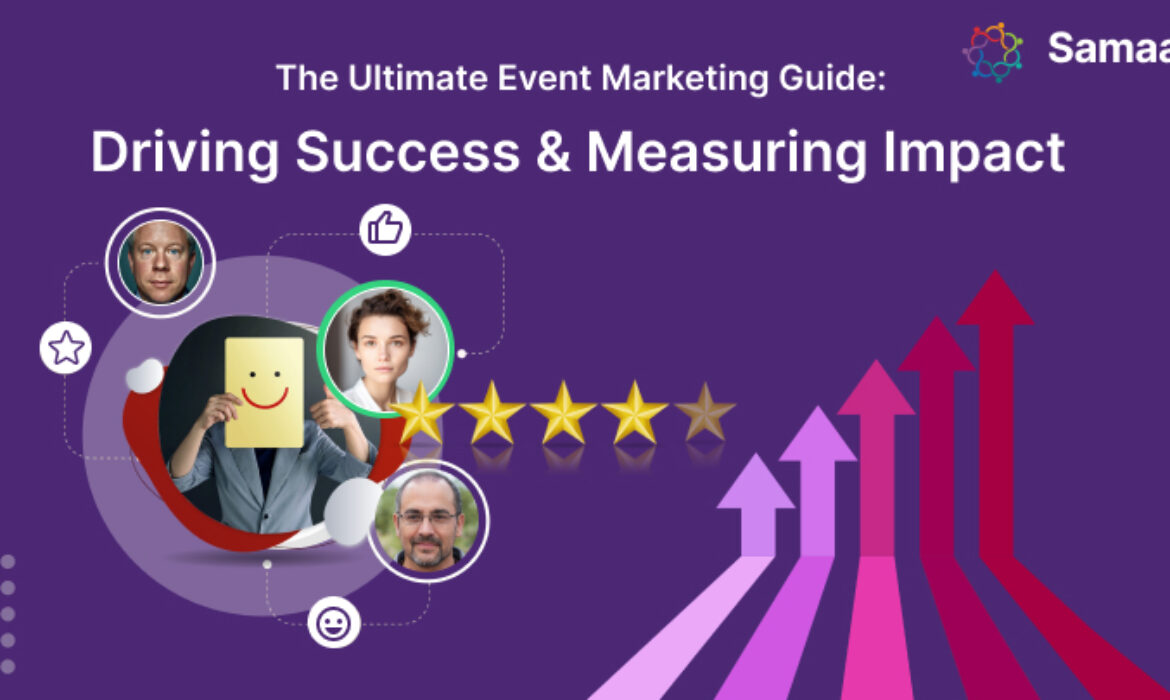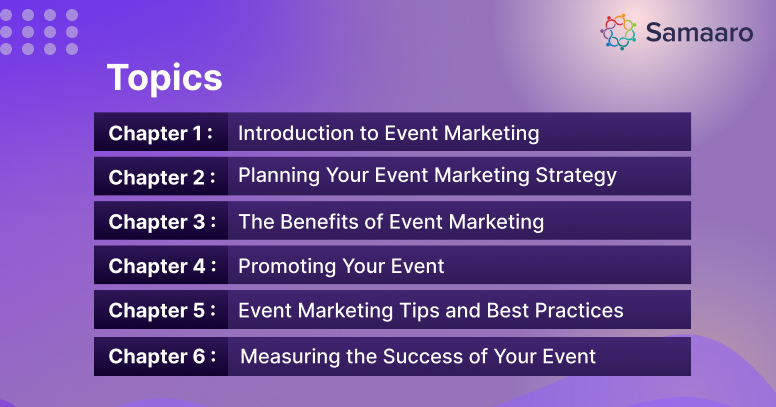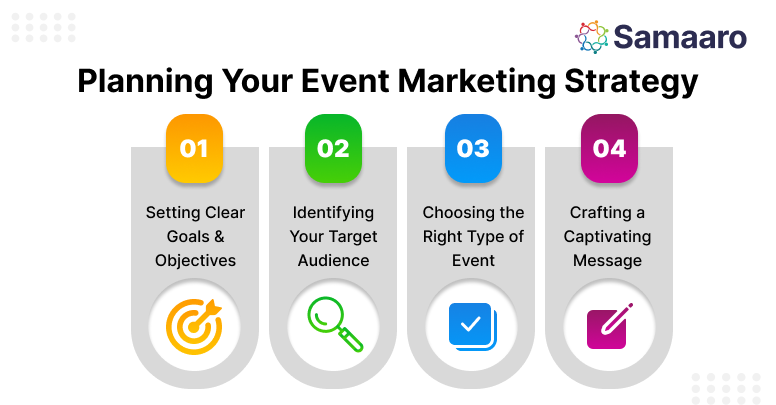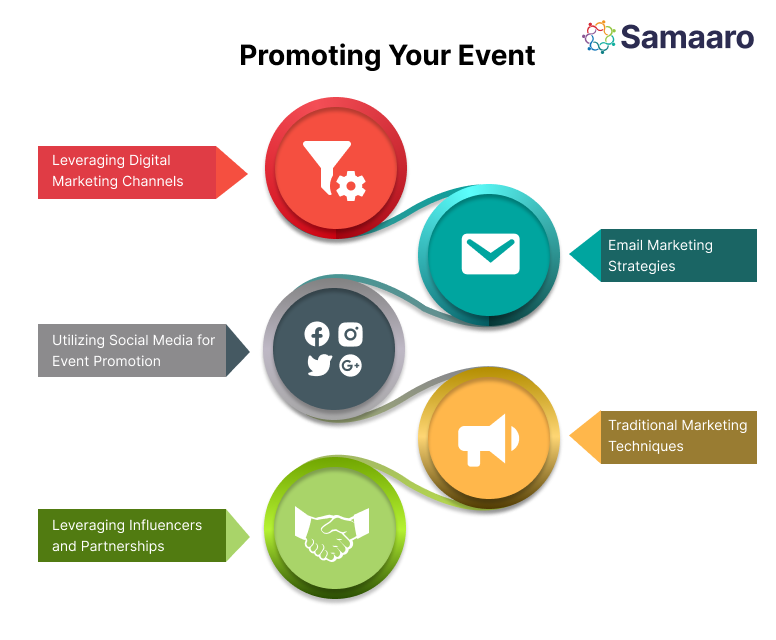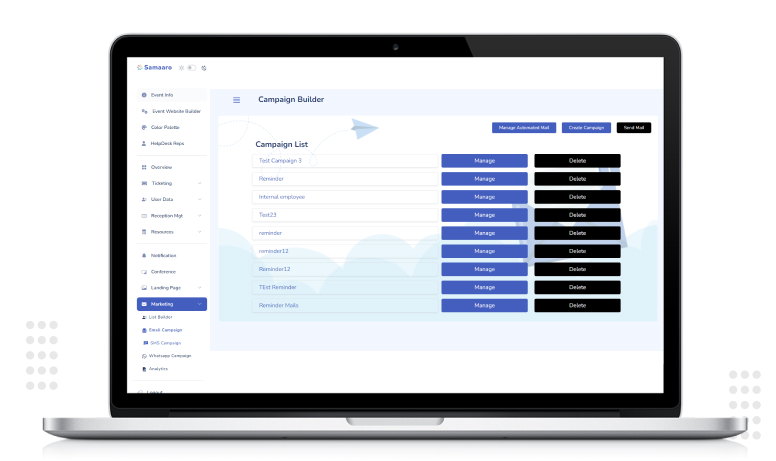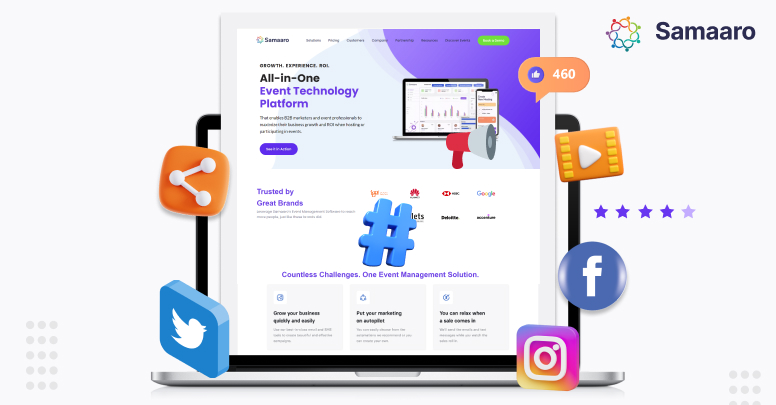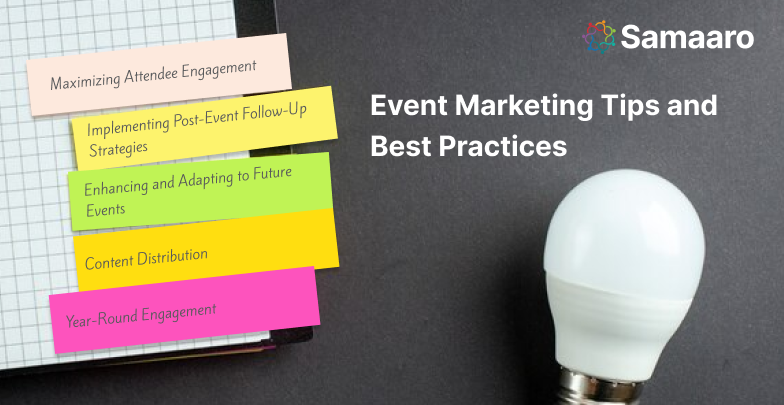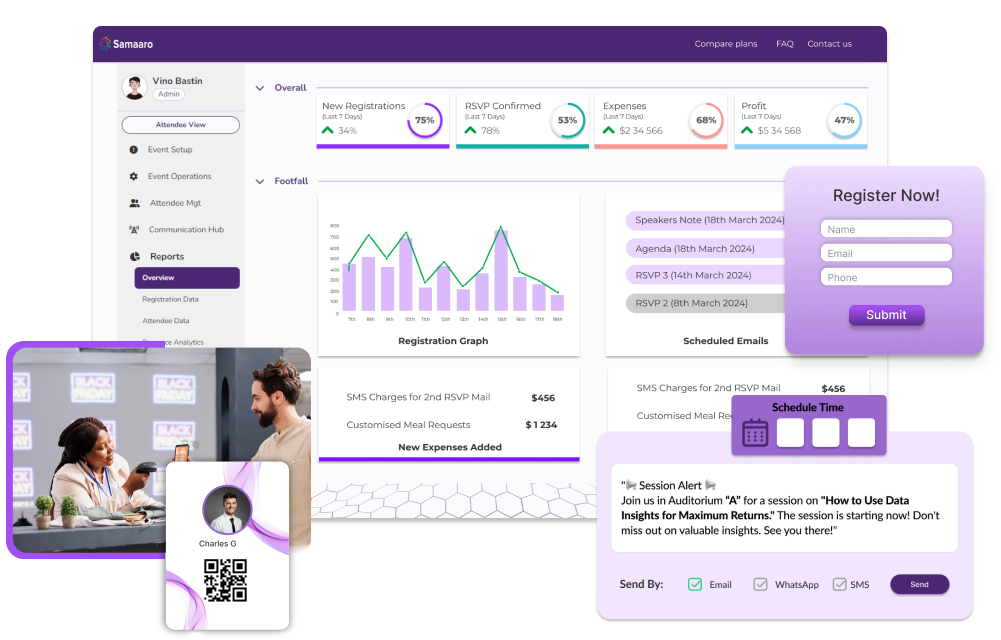The fact that “98% of attendees at live events engage in content capture” speaks volumes.
In today’s fast-paced and ever-evolving business landscape, finding innovative ways to capture your audience’s attention is paramount. This is where event marketing comes into play. Event marketing is not just about throwing a party or organizing a conference; it’s a strategic approach that can elevate your brand, engage your audience, and drive success like never before.
This guide will cover the following topics:
CHAPTER 1: Introduction to Event Marketing
In recent times, the business world has undergone a profound transformation. The emergence of digital marketing may give the impression that conventional approaches to engagement have been sidelined. However, there is a resurgence of interest in current events, and with good reason. People are always curious about authentic, in-person encounters. They desire a personal connection with brands, and events offer the ideal platform to do so.
Event marketing is no longer an option but a necessity in the modern era. By breaking through the digital noise, events enable you to leave an indelible mark on your audience. They provide a platform to exhibit one’s products or services, foster connections, and cultivate a devoted clientele.
This comprehensive guide is designed to be your go-to resource for planning, executing, and measuring the impact of your event marketing efforts as an event organizer. We’ll walk you through the entire process, from understanding what event marketing is, to setting clear goals, promoting your event, ensuring seamless execution, and measuring success.
CHAPTER 2: Planning Your Event Marketing Strategy
Having a well-thought-out plan in place is crucial before you start preparing an event. This chapter will walk you through the fundamental procedures to make sure your event marketing is purposeful and in line with your company objectives.
Setting Clear Goals and Objectives
As an event organizer, you are aware that the key to any successful event is having a clear goal in mind. We will discuss how to create goals and objectives for your event that are SMART (Specific, Measurable, Achievable, Relevant, and Time-bound). For example, if you’re planning a corporate seminar, your objectives might be to draw in 300 experts from the industry, produce leads, and raise brand awareness in the intended audience.
Identifying Your Target Audience
Understanding your audience is one of the core elements of event marketing. As the event organizer, you need to describe the kind of individual you want to see there. Take into account interests, pain issues, and demography. Make your event fit their interests and requirements. Your marketing strategy will be very different from that of an event targeted at art fans, for instance, if your event is for tech aficionados.
Choosing the Right Type of Event
Every event is not done equally. The kind of event that best fits your objectives and target audience must be carefully chosen by you as the event organizer. Selecting the appropriate format is essential. Some examples of formats are workshops, product launches, conferences, seminars, trade shows, or special hybrid events that incorporate aspects of multiple formats. For instance, a conference might be the best option if you’re targeting professionals looking for educational information. On the other hand, if you want to introduce a new product to prospective buyers, a product launch can be perfect.
Crafting a Captivating Message
The messaging of your event is the central focus of your marketing campaigns. Creating an engaging message that connects with your audience and establishes the tone for your event is your responsibility as an event planner. For example, if you are planning a charity gala, emphasize in your message the importance of participants’ contributions to the community and the cause you are supporting. However, if you’re throwing a music festival, you should emphasize the fun, the lineup, and the entire experience in your messaging.
CHAPTER 3: The Benefits of Event Marketing
As an event organizer, you are aware of the many advantages that can result from your efforts in event marketing. Let’s take a closer look at these advantages.
Increasing Credibility and Visibility of Brands
Events present a special chance to raise the profile and trustworthiness of your brand. Events are a great way for you as an event planner to highlight the principles, skills, and character of your company. You may build a reputation for excellence by producing events that are consistently of the highest caliber.
For instance, Apple’s product launch events have grown to be legendary and have greatly enhanced the brand’s image for creativity and cutting-edge technology.
Building Robust Relationships with Customers
Deep relationships are forged through personal interactions. You have the opportunity to build trusting relationships with your clients as an event planner. You may increase consumer loyalty by having in-person interactions and offering good experiences or content.
For example, hosting a user conference for software clients fosters a community where users can interact, exchange stories, and offer candid criticism—all of which help to improve consumers’ perceptions of your company.
Generating Leads and Driving Sales
Events are a powerful technique for generating leads. You can draw in clients who are actually interested in your goods or services as an event planner. Gathering contact details from attendees and interacting with them throughout the event will help you produce leads that are more likely to become sales.
A trade show booth featuring captivating product demonstrations, for instance, can draw in visitors who are inclined to make a purchase down the road.
Building a Community Around Your Brand
As an event organizer, you may lay the groundwork for creating a devoted following of brand evangelists. You may encourage a sense of loyalty and belonging by organizing events that unite people who share similar interests.
CHAPTER 3: Promoting Your Event
After you have a plan in place, it’s time to effectively market your event. We’ll look at many marketing avenues and strategies in this chapter to make sure the correct people learn about your event.
Leveraging Digital Marketing Channels
When it comes to promoting events, digital marketing is essential. As the person planning the event, you ought to maximize your internet visibility. Make sure your website has all the information people need to know about your event, such as the schedule, speakers, and registration information. Use SEO (Search Engine Optimization) to increase the online visibility of your event. To promote your event on websites like YouTube, think about making interesting videos and using online advertising to attract a wider audience.
Utilizing Social Media for Event Promotion
Social networking sites are becoming priceless tools for promoting events. You can use Facebook, X (Twitter), LinkedIn, Instagram, and other networks to efficiently promote your event as an organizer. Create material that is interesting to share. To foster a feeling of community and inspire participants to share their joy, use hashtags unique to the event. Provide teases, behind-the-scenes photos, and suspenseful narratives.
LinkedIn can be utilized, for instance, to establish connections with tech industry people and disseminate information about your upcoming technology conference. You can use visually appealing images and stories on social media sites like Instagram to highlight the venue, speakers, and general atmosphere of your event.
Email Marketing Strategies
Email marketing is still a very effective way to advertise events. You may reach potential attendees by creating efficient email marketing as an event organizer. To spark attention, begin with customized invites. As the date of the event draws near, send out reminders. Provide all pertinent information in your emails, including links for registration, speaker bios, and the agenda. To incentivize recipients, you can also provide exclusive discounts or incentives for early bird registration.
Traditional Marketing Techniques
Don’t undervalue the effectiveness of conventional marketing techniques, even though digital marketing is crucial. As an event planner, you ought to think about combining offline tactics with your online ones. Creating and distributing printed items like flyers, posters, and brochures may fall under this category. Attendees frequently value reusable, visually appealing marketing materials that they can handle and consult. Furthermore, if traditional media channels still resonate with your target audience, don’t discount them as a means of targeting specific demographics. Examples of these channels are newspapers and radio.
Leveraging Influencers and Partnerships
Working together may change the game when it comes to promoting events. To increase the reach of your event, as an organizer1, think about finding and collaborating with strategic partners and influencers. Working together with influencers in your field can help you reach out to their current fan base, which will increase the visibility of your event and give you credibility. Similarly, collaborating with like-minded companies or groups can lead to joint marketing and resource sharing.
For instance, you may collaborate with nearby eateries, food bloggers, and culinary influencers if you’re planning a food and drink festival. Their participation and endorsements can greatly increase the legitimacy and audience for your event.
What Samaaro has to offer?
List Building
Collect and store data on all potential and past event attendees in a single location. This includes details like names, contact information, preferences, and attendance history. Successful event marketing hinges on effective audience targeting. In the digital age, having a well-organized list of potential and past attendees is invaluable. An event marketing dashboard simplifies the process of list building by offering a centralized repository for all your audience data.
Audience Segmentation
Once you’ve built your list, the next step is to segment your audience effectively. Audience segmentation involves categorizing your contacts into distinct groups based on specific criteria. This allows you to send personalized and highly relevant messages to different segments of your audience. Segment your audience by engagement levels, distinguishing between highly engaged, moderately engaged, and less engaged individuals. This helps in creating targeted re-engagement campaigns. Different segments of your audience may have varying interests and preferences.
Targeted Marketing Campaigns
Using audience segmentation, you can send content that caters specifically to each segment. For instance, you can send detailed technical content to the segment of your audience interested in technical aspects, while providing high-level overviews to those who prefer a broader perspective. Beyond improving your targeting and engagement, list building and audience segmentation offer a wealth of data-driven insights. By analyzing the performance of each segment, you can refine your marketing strategies, track attendee behavior, and make informed decisions for future events.
Integration
Thematic Event Website Builder: Samaaro’s thematic event website builder is a powerful tool that allows you to create stunning and highly customizable event websites. It offers features like drag-and-drop design, pre-designed templates, and real-time updates. This enables you to effortlessly craft an engaging online presence for your event, complete with branding and content customization.
Email Campaigns: Samaaro simplifies event promotion with its email campaign capabilities. You can seamlessly create and manage email campaigns, reaching out to your target audience with event updates, reminders, and important information. The platform provides analytics to track the success of your campaigns, ensuring efficient communication.
Push Notifications: Samaaro’s push notification feature is an asset for event organizers. It allows you to send real-time updates, announcements, and reminders directly to attendees’ devices. This instant and direct communication channel enhances attendee engagement and ensures that they stay informed throughout the event.
CHAPTER 5: Event Marketing Tips and Best Practices
As an event organizer, now that you have mastered the fundamentals, it is time to investigate advanced strategies and best practices that will increase the effectiveness of your event marketing efforts.
Maximizing Attendee Engagement
Attendee engagement is critical to the success of your event as an event organizer. There is a greater likelihood that engaged attendees will retain the information presented at the event and create lasting memories of their experience. To optimize user involvement, take into account the subsequent tactics:
- Interactive Sessions: Incorporate sessions that foster audience engagement via live polling, question-and-answer sessions, or seminars.
- Networking Opportunities: Foster connections among participants by organizing networking sessions, which may take place in person or virtually.
- Gamification: Incorporate gamification elements, such as contests or challenges, to enhance the interactivity and enjoyment of the event.
- To engage attendees and promote collaboration, one might arrange a coding challenge or hackathon during a technology conference.
Implementing Post-Event Follow-Up Strategies
When the event concludes, it is not over. Post-event follow-up is of the utmost importance for event organizers to preserve relationships and guarantee a lasting impression. Execute the subsequent strategies:
- Express gratitude by means of personalized thank-you emails addressed to sponsors, attendees, and speakers.
- Content Distribution: Enhance the value of the event by providing attendees with recorded sessions, presentation materials, and event highlights.
- Actively solicit feedback from attendees and incorporate their input into the development of subsequent events.
- Year-Round Engagement: Sustain audience involvement throughout the year by means of newsletters, webinars, or exclusive content distributed in between events.
Enhancing and Adapting to Future Events
It is crucial for event organizers to consistently modify and enhance their event marketing strategies. The following are several critical domains to concentrate on:
- Feedback Implementation: Respond to attendee feedback in order to rectify concerns and improve the overall experience of the event.
- Maintain your events’ allure by keeping abreast of the most recent event trends and technologies.
- Engage in debriefings with your team following each event to analyze what was successful and identify areas that require improvement.
- When feasible, investigate environmentally favorable alternatives and contemplate the ecological consequences of your events.
CHAPTER 6: Measuring the Success of Your Event
The success of your event goes beyond the applause on the day; it’s about achieving your goals and proving a return on investment. As an event organizer, it’s crucial to measure the impact of your efforts.
Defining Key Performance Indicators (KPIs)
The Key Performance Indicators (KPIs) that are most pertinent to your event and business goals should be defined by you as the event organizer. KPIs are measurable indicators that assist you in determining the event’s success. For event marketing, event technology platforms like Samaaro come into the picture that can provide a lot of data and analytics to make the upcoming events better by analyzing this data.
- Attendance Numbers: The overall count of attendance in relation to your original targets.
- Lead Generation: The quantity of fresh leads or prospective clients that the event brought in.
- Brand Exposure: Social media mentions, press coverage, and buzz generated after an event are indicators of your brand’s exposure and reach.
- Revenue generation is the event’s financial impact, which includes sales of items, tickets, and goods and services
Collecting and Analyzing Data
When evaluating the success of your event, data is an event planner’s best friend. Gather information from a range of sources, including survey questions conducted on-site, registration forms, social media analytics, and ticket sales platforms. Gain useful insights into the behavior, preferences, and demographics of attendees by analyzing this data.
Track attendance, session popularity, and engagement levels with event management software. Track social media data to gauge the online attitude and reach of your event. You can modify your marketing and event plan for upcoming events by examining this data.
The Importance of Attendee Feedback
Attendee input is very valuable. Gathering input from attendees can help you as the event planner identify what went well and what needs to be improved. Give participants a chance to voice their thoughts by using surveys or assessments conducted after the event. Aspects such as the overall experience, event organization, and topic relevancy should be covered in the questions.
Additionally, think about holding interactive exercises that promote real-time feedback or in-event feedback sessions. Feedback from attendees not only demonstrates your appreciation for their opinions but also helps you improve future events.
Monitoring ROI (return on investment)
As an event organizer, return on investment (ROI) is a crucial indicator for evaluating the event’s financial impact. Compute the return on investment (ROI) by contrasting the total revenue of the event—which includes ticket sales and any sales made on-site—with the total expenses—which include personnel costs, venue rental, marketing, and other expenses. A high return on investment (ROI) suggests that your event was profitable.
In the world of event marketing, success is not measured by the number of attendees alone. It’s about creating memorable experiences, fostering meaningful connections, and achieving your strategic goals. As an event organizer, you have the power to leverage event marketing to enhance your brand’s visibility, build a community, and drive success like never before.
Experience Samaaro and unleash the power of automated event marketing, start your free trial today!

